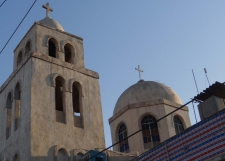Three Coptic Christian teenagers convicted of blasphemy should have their five-year jail sentences overturned, Human Rights Watch (HRW) said today.
The organisation urged Egypt to uphold its promise to protect religious minorities, and called for legislation used to prosecute blasphemy to be revoked.
"These children shouldn't face prison for expressing themselves, even with an immature joke," said Nadim Houry, HRW's deputy Middle East director. "The continued prosecution of blasphemy cases in Egypt goes against the government's claim to be promoting a more inclusive vision of religion."
Three Christian teenagers, who are still in high school and now aged between 16 and 17, were sentenced to five years in jail by a court in Minya last month. They have been identified as Mueller Edward, 17, Bassem Hanna, 16, and Alber Ashraf, 16.
They were charged with blasphemy after being filmed by their teacher pretending to pray while reciting verses from the Qur'an in January 2015. The students are shown in the video laughing and one appears to pretend to slit the throat of another, apparently mocking ISIS-style beheadings.
The lawyer representing the teenagers, Maher Naguib, told AFP they were "sentenced for contempt of Islam and inciting sectarian strife".
"The judge didn't show any mercy," Naguib added. "He handed down the maximum punishment."
They were charged under article 98(f) of Egypt's penal code, which outlaws contempt of religion, as well as articles 160 and 161, concerning the public conduct of religious rituals, even though the video was filmed in private, HRW said.
A fourth defendant, 17-year-old Clinton Yousef, was sent to a juvenile detention centre for an indefinite period. The teacher, Gad Younan, had previously been sentenced to three years in prison for his role.
When the video was first found and circulated last year, anti-Christian protests broke out in the teenagers' village. Hundreds of Muslims attacked Coptic homes and businesses, and attempted to storm a church.
Edward's father told HRW that the teens were "psychologically troubled by the killings of Coptic Christians in Libya and went for entertainment".
"They didn't deliberately intend any offence," he added. "How can you try someone for mocking ISIS?"
More than 28 human rights groups and political parties in Egypt have condemned the rulings. They have urged the government to repeal article 98(f), which has led to a rise in prosecutions for blasphemy under President al-Sisi.
In 2015, at least 12 people, including Christians, atheists, and Sunni and Shia Muslims, were convicted for blasphemy-related charges.
"Mocking ISIS, or any religious group, with a childish joke is not a crime," Houry said. "Instead of giving in to retrograde views on blasphemy, Egyptian authorities should protect freedom of expression."















